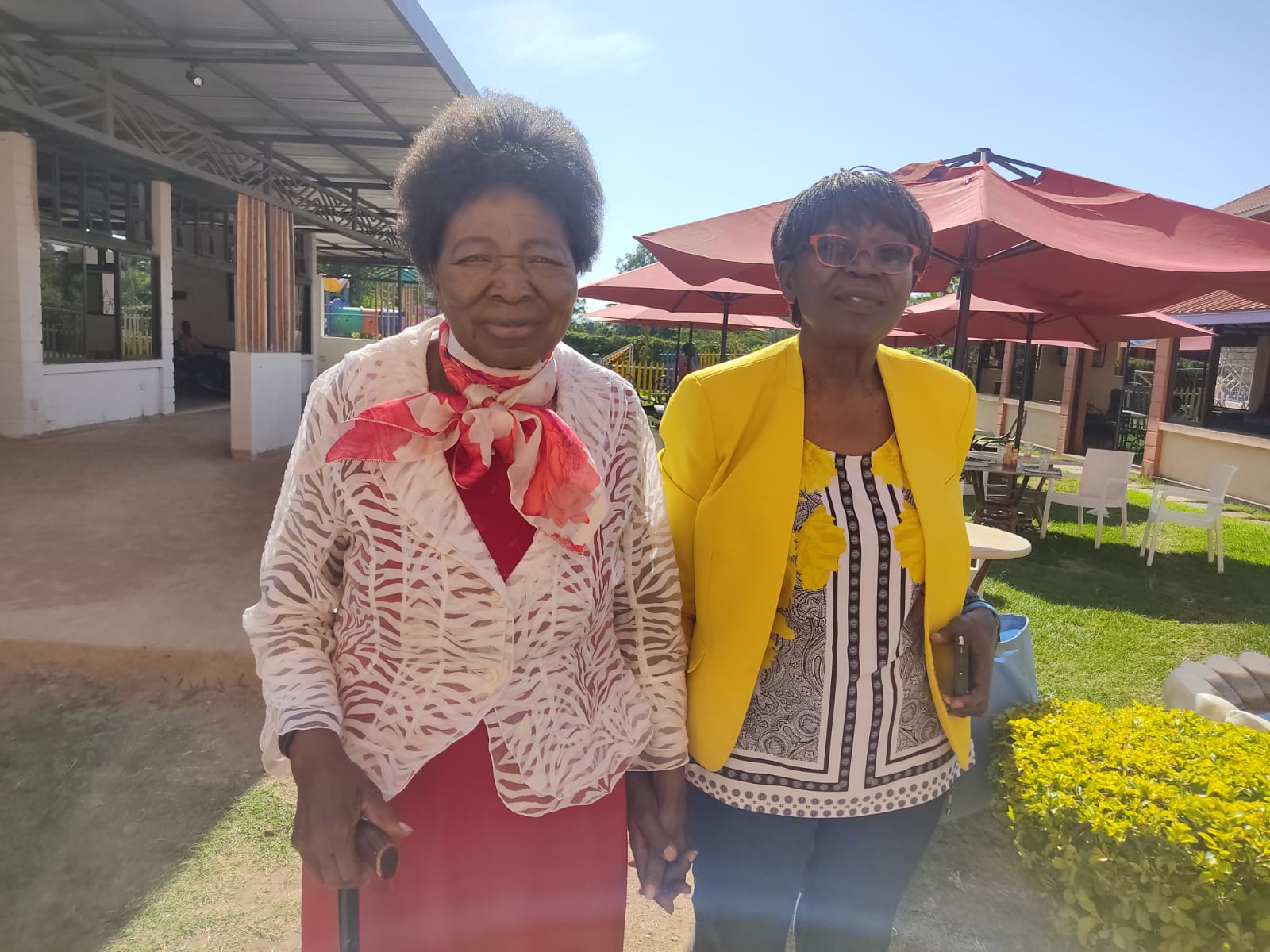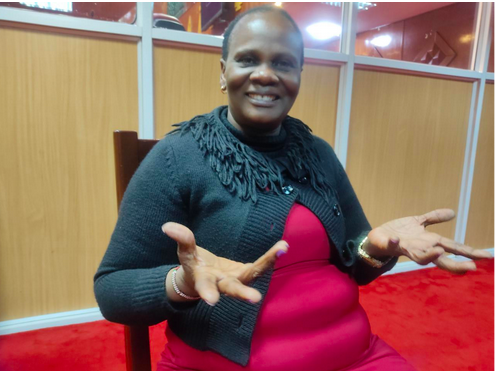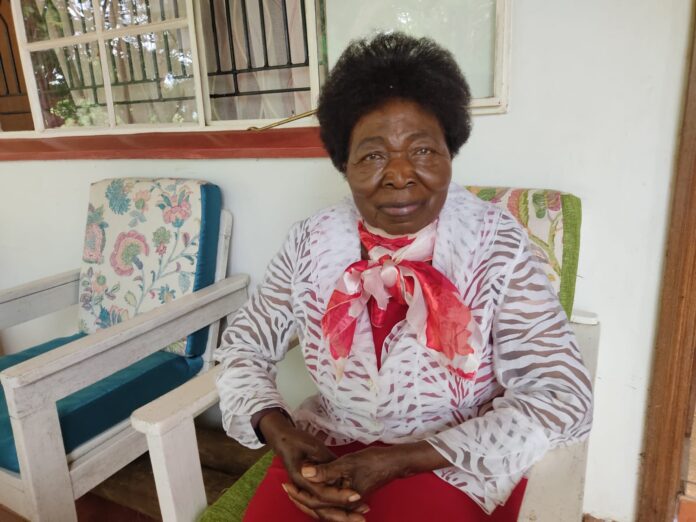By Claret Adhiambo
Nairobi, Kenya: Meet 91 year old Mama Phoebe Asiyo, a Veteran political scion hailing from Kanyaluo area as she takes careful steps at her expansive mansion in Karachuonyo Constituency, Homabay County.
“Political scars that have remained in my body and mind” says Mama Phoebe Asiyo.
As she walks her gradual pace might be attributed to her advanced age and a lingering effect of a poisoning incident from which she was fortunate to recover, serving as a constant reminder of the treacherous waters of a political environment filled with perilous adversaries.
“I almost died you know,” she quips when I inquired about the poisoning incident that occurred when she was on a campaign trail.
The discussion about the poisoning evidently causes Mama Phoebe distress. Her posture abruptly shifts, and she clasps her hands tightly as tears well up in her eyes.
“A woman claiming to be my supporter attempted to poison me using dry fish. She claimed to have prepared the fish in my honor. I noticed she did not want me to share the meal with another woman sitting next to me. I became suspicious but I went ahead and ate the fish. Not long after, I developed excruciating stomach pains and started vomiting. I could see traces of blood in my vomit. I also developed a running stomach,” she narrates.

“Yes I still suffer the consequences of the poisoning. This has sentenced me to a lifetime of medication and medical checkups. Were it not for my ability to access some of the best medical facilities courtesy of my children, I do not think I would be here today.”
She says other women in the campaign trails have paid the ultimate price with their lives.
“There is this woman who was campaigning in Embu and she was going to win and when they saw her vehicle coming, they blocked her way and they hit her. She never walked again until she died. Those are the scars of politics that remain with you for the rest of your life,” she narrates.
Mama Phoebe as she is popularly referred to has lived through the pre-colonial, post colonial periods and is now living to see the political fruits brought by women who dared to dream.
In her book ‘It Is Possible’ Mama Phoebe says that the struggle for women did not start in the post colonial era but during the pre-colonial era when thousands of women Mau Mau fighters were jailed.
Mama Asiyo is a woman of many firsts; she was the first African President of Maendeleo ya Wanawake having been elected in 1958, she was the first female MP in South Nyanza, serving the vast Karachuonyo constituency from 1980 to 1997, she was also the first woman elevated to the position of Luo elder.
She says that a lot had to be done to change the perceptions of Kenyans with regards to women in politics.
“This is evident by the record number of seven female governors elected in the 2022 General Elections and the many women who are vying and being elected for various seats in both the national assembly and the county assembly seats,” she says.
During her tenure as the MP for Karachuonyo, Mama Phoebe was known for her famous Affirmative Action Motion she tabled in parliament in 1997.
In addition to various other provisions, the affirmative motion called for the government to propose a constitutional amendment that would establish two parliamentary constituencies exclusively designated for women within each of the former eight provinces.
Though defeated in 1997, Mama Asiyo’s Affirmative Action Motion would later be implemented in full by former Dagoretti MP Beth Mugo in April 2000.
In 2001 Mama Asiyo was appointed to the defunct Constitution of Kenya Review Commission as a commissioner.
Despite all these an Afrobarometer Data Survey analysis shows that more women than men still believe in women’s political leadership.
She acknowledges the success of Beth Mugo’s Bill to the unity of both men and women.
“This is evident by the record number of seven female governors elected in the 2022 General Elections and the many women who are vying and being elected for various seats in both the National Assembly and County Assembly seats,” she says.
The 12th parliament consists of 416 members in total with only 97 members being women.
“I am particularly proud of these various regions in Central Kenya and Rift Valley that elected many female governors and female MPs. Look at my home turf in Homabay. We have five women elected, four in the National Assembly and one as the governor for Homabay County.”

Reaping The Affirmative Action Fruits
Rosemary Masitsa is one of the many female politicians reaping from the fruits of the affirmative action and the promulgations of the constitution that brought forth the two thirds gender rule which has seen more women nominated to various positions.
Masitsa was elected the MCA of Makina Ward in Kibra Constituency in the 2022 General Elections. Before the elections, Makina served as a nominated MCA in the Nairobi County Assembly.
The Afrobarometer data survey further shows that many Kenyans believe that the government is doing enough in promoting equality for women.
She clinched the ODM ticket after a cut throat nomination process always likened by the ODM party.
“The nominiation helped me interact with many women politicians like Martha Karua, Esther Passaris and even Mama Phoebe Asiyo. When the elections came, I told my party that I did not want a direct ticket because I knew I had done enough work to beat my opponents,” she says.
Masitsa won the ticket and went ahead and clinched the Makina Ward seat, beating her closest opponent with over 3,000 votes.
“It was not easy, like many women, I encountered a lot of violence especially from my male opponents. Some were sexist remarks at public gatherings and some were done by bloggers online. Inasmuch as the attacks were not physical, I felt that they stripped me naked and ripped off my dignity.”
“But my win is a testimony to all the women in Kibra that regardless of age, they can become whatever they want to be in life,” she says.
A report launched this year by UN Women attributes the low number of women elected to various political seats to the limited access to resources women have, the control of political parties and generally the male dominance in the political field.
“The cost of electoral politics has increased over the years. Studies show that women pay more for the same posts than men. It costs women more to be elected even if it is the same post. It suffices to mention that costs have always been a barrier because women without property to use as collateral cannot access loans like me,” the report reads in part.
University of Nairobi Professor Karuti Kanyinga who conducted the study on behalf of UN Women says that the dynamics of challenges women are facing keep changing.
“Men who own political parties have weaponized the position of women representatives and are using the position to bar women from vying for the political seats,” says Prof. Kanyingi.
The Afrobarometer data further states that Western Region leads all other eight regions in the country in embracing women political leadership.
“The problem we have in Western region is that the dominant parties in these regions have refused to give women nomination opportunities,” Prof Kanyingi explains the data.
He however appreciates that perceptions have changed and according to him things will get better.
“There is improvement but we need more because women's problems are currently not only patriarchal but have evolved to economic and even politics of associations,” he says.
Mama Asiyo not only attributes the political strides to the women who vied when there was a lot of patriarchy. She also appreciates the women and men who were courageous enough to vote for the women who voted.
“I remember one woman who almost gave birth on the queue while waiting to cast her vote. In this particular election more women had turned up to vote than men. The sun was very hot, some had children on their backs. One was experiencing some labor pains but she insisted on staying there until she cast her vote. I salute these women so much.”














